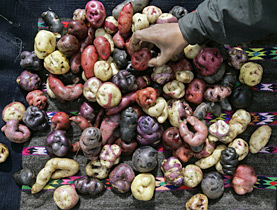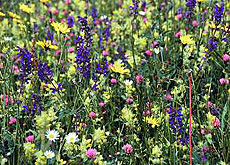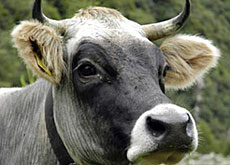Potato promoted as food staple of the future

The United Nations has declared 2008 the year of the potato to highlight the significance of the tuber for food security for future generations.
Swiss aid agencies run projects in Latin America to promote sustainable and eco-friendly cultivation methods in an effort to safeguard biodiversity.
“I shall not neglect to suggest to my countrymen to introduce the plant known as the potato,” said the Italian friar Agostino Dal Pozzo in a text published in 1820.
“The French call it Pomme de terrre and the Germans Herdapfel. The Irish and the Swiss, two wise and hard-working nations, were the first to introduce them.”
The friar suggested the potato be cultivated as a food staple despite widespread prejudice in Europe 200 years ago.
The vegetable, which grows underground, was believed to be the carrier of leprosy, tuberculosis and venereal diseases or at least cause serious stomach ache. The potato was also responsible for mist and flooding, it was believed.
Two centuries later the UN has recognised the importance of the potato.
“The International Year of the Potato will raise the awareness of agriculture in general in addressing the issues of global concern, including hunger, poverty, and threats to the environment,” a statement said.
Key role
The world’s population is expected to grow by more than 100 million people a year, notably in developing countries, over next two decades.
Experts say the potato – with its 5,000 varieties – will play a key role in food security. It is easy to cultivate. It is ideally suited to places where land is limited and labour is abundant.
A major advantage of the tuber over other foodstuffs is that it comes in many varieties. Some of them grow at high altitude, while others are found in tropical climates or even in arid zones.
The potato is well regarded for its high nutritional value. The yield from one hectare of potato provides 16.7 million calories. This is enough to feed 7,200 people.
Local varieties
Development aid organisations are concerned about the disappearance of traditional species of potatoes.
“In many countries particularly in Latin America, new varieties have been introduced. They should, at least in the beginning, result in larger crops than the local varieties,” said Caroline Morel of the development organisation Swissaid.
“The farmers are encouraged to grow the new varieties of European origin at the expense of the potatoes which are adapted to the local climate and environment.”
Insecticides, fertilizer and pesticides, which are costly and damaging to the eco-system – are used in a bid to boost profits and potato harvest, according to Morel.
Swissaid is running projects in Ecuador to counter this trend. The aim is to help farmers continue the cultivation of local potatoes on an organic basis and provide them with the necessary tools.
“A farmer who grows potatoes at 4,000 metres above sea level knows that he has to rely mostly on seeds from the traditional varieties of the tuber,” says Susanne Hochuli.
The member of the Green Party has recently returned to Switzerland from a fact-finding mission to Ecuador.
Many people in the Andes region play a risky game, according to Hochuli, because they compromise food security.
“They abandon their land to go and work for major agricultural firms. Thus they not only lose a staple food but also a source of income. Not least, the know-how about local potatoes disappears,” added Hochuli, who is herself an organic farmer.
Similar projects by the Swiss Agency for Development and Cooperation (SDC) are underway in other Latin America countries.
Experts hope that they will help local farmers reacquire the traditional techniques so they can grow crops big enough to feed their families and sell the surplus on the local markets.
Peeling test
The economic and social importance of the potato in future development aid projects was highlighted at a workshop co-hosted by SDC and the Federal Institute of Technology in Zurich last month.
The institute staged an exhibition The Odyssey of the Potato which highlighted the role of the tuber in the culture of the Latin American continent before the arrival of the European conquerors.
The potato was also attributed with values that went beyond the Western criteria of quality.
The Llunchuy waquachi tuber (see picture) played an important part in declaring women eligible for marriage. If a girl managed to peel the peculiarly-shaped potato she was seen fit to get married.
swissinfo, based on an article in Italian by Andrea Clementi
The potato is the fourth most important food crop after wheat, maize and rice. More than 300 million tonnes of potato are produced annually.
Production of potatoes has increased by 4.5% annually worldwide in the past decade.
Average per capita consumption of potatoes in Europe was 93kg in 2003 and 22kg in developing countries.
Potatoes are grown in 125 countries worldwide, and the fields cover an area 195,000km2.
An average-size potato contains about 110 calories, three grammes of protein, 23 grammes of carbohydrate but no fat. It also provides about half the amount of vitamin C needed for an adult person on a daily basis, as well as iron, potassium and zinc.
The potato is an herbaceous plant which was probably first cultivated in the region of Lake Titicaca (modern-day Bolivia and Peru) about 10,000 years ago.
The farmers of the Andes region began selecting edible forms of wild potato and succeeded in producing increasingly better varieties.
The first modern potato (Solanum tuberosum) was apparently grown about 7,000 years ago.
The potato plant reached Europe in the 16th century and later disseminated by missionaries, merchants and colonists.

In compliance with the JTI standards
More: SWI swissinfo.ch certified by the Journalism Trust Initiative


You can find an overview of ongoing debates with our journalists here. Please join us!
If you want to start a conversation about a topic raised in this article or want to report factual errors, email us at english@swissinfo.ch.